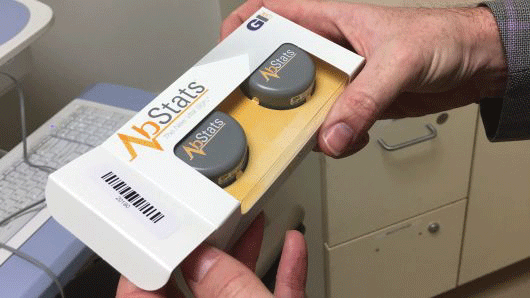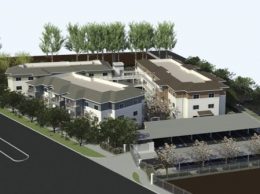GI Logic develops monitoring device that listens to your gut
IN THIS ARTICLE
- Central Coast Topic
- Marissa Nall Author
By Marissa Nall Friday, August 3rd, 2018

The AbStats device developed by GI Logic monitors sub-audible vibrations in the intestinal tract.
The Tri-Counties could become the launching point for the first new vital sign in decades with the help of a device that listens to the gut.
Developed by GI Logic, the AbStats device monitors sub-audible vibrations in the intestinal tract to give doctors a readout with an “intestinal rate.” For a patient recovering from surgery, a seven is good and a three not so good, giving doctors feedback on how the gut is functioning that can help prevent complications.
“It gives them their first quality control check to realize this patient is in trouble — let’s act now,” catching potential problems a day earlier, said Dennis Houghton, vice president of sales for GI Logic.
The device is the brainchild of a GI physician and a CalTech engineer, sitting at the intersection of biology, software and technology, said co-founder and co-CEO Gary Sterling. Regulatory approval in hand, the Pasadena-based company is looking to the Tri-Counties to grow its manufacturing and product development.
“It is the only wearable technology that can continuously monitor digestive function, and when you think about that, you almost think that’s crazy. How can this have taken so long?” Sterling said.
The company also has a funding round underway but declined to state how much it is aiming to raise. In addition to the move, it plans to use the capital to build inventory and bring on new staff “to create the infrastructure we need not only to sell but to support our products, to train hospitals, physicians, health care staff on our products and get the products out there.”
Though it hasn’t landed on a location yet, the team is eyeing the cluster of biotech facilities in Thousand Oaks or manufacturing and production facilities in Camarillo or Oxnard. Close proximity to UC Santa Barbara is also an advantage, Sterling said, as it looks to add 10 to 15 new employees over the next year and grow to around 30 in later years.
The Small Business Development Center highlighted medical devices and biopharmaceuticals as an emerging area of growth in the region, where biotech has historically had a large footprint.
Density and an ability to find capital have driven inquiries from several companies looking to make a move to the region, said Executive Director Ray Bowman.
“Having the support of other companies, the community, the ecosystem, is all an important thing,” he said. “Those types of companies are the ones that really support our economy … The multiplier effect on those types of businesses is pretty big. For those emerging sectors, it only takes sometimes a few companies to make a huge impact on what that cluster looks like.”
In addition to a more traditional inpatient device for hospitals with sensors and a readout screen, the company has developed single-use wearable sensors for users with conditions that impact the gut such as Crohn’s disease, irritable bowel syndrome or ulcerative colitis. The sensors can provide information like when a patient’s stomach is empty or when they should eat, impacting length of stay and potentially reducing costs for both patients and providers, Houghton said.
It can also show the impact of medications or factors like stress and sleep, he said.
“You’ll be able to better understand how you eat, how your stomach reacts to exercise, stress, lifestyle issues and learn how to keep it in a sweet spot, because you’ll be able to correlate that to the symptoms you’re experiencing,” Sterling said. “It will help give you the biofeedback that you need to make decisions on the right time to eat, which can help with complying with diets and changing habits.”
Researchers at Cedars-Sinai Health System helped develop the product, which got FDA clearance to be used by physicians in hospitals in 2016, after the company raised $2 million from Commonwealth Diagnostics International.
GI Logic has also agreed to support a large clinical research study with four Veterans Health Administration hospitals, Sterling said, providing GI monitoring for veterans being treated for GI disorders and procedures.
The technology also has applications in animal health and, most valuably, he said, in neonatal and pediatric care.
“They can’t tell you where it hurts,” he said. “We have a noninvasive, painless monitoring system that won’t scare them, won’t hurt them and will help physicians better understand how their digestive system is working.”
As a result, the founders have split the business into GI Logic and an animal division with the help of strategic partners in the industry under the umbrella Alpha Logic.
“We’re human health guys, that’s our expertise, so we need to find expertise in the veterinary health, animal health area,” Sterling said. “Big markets can do a lot of good, and certainly there’s a lot of value in providing low-cost, efficient health care monitoring for both large animals and small animals.”
And the research won’t stop with bringing the product to market, he said.
“That’s what’s so exciting about this technology. We’re always learning, because we’re gathering signals and comparing them to symptoms … We will always be studying something, because there’s so much out there with the intestinal tract to study.”
• Contact Marissa Nall at [email protected].












